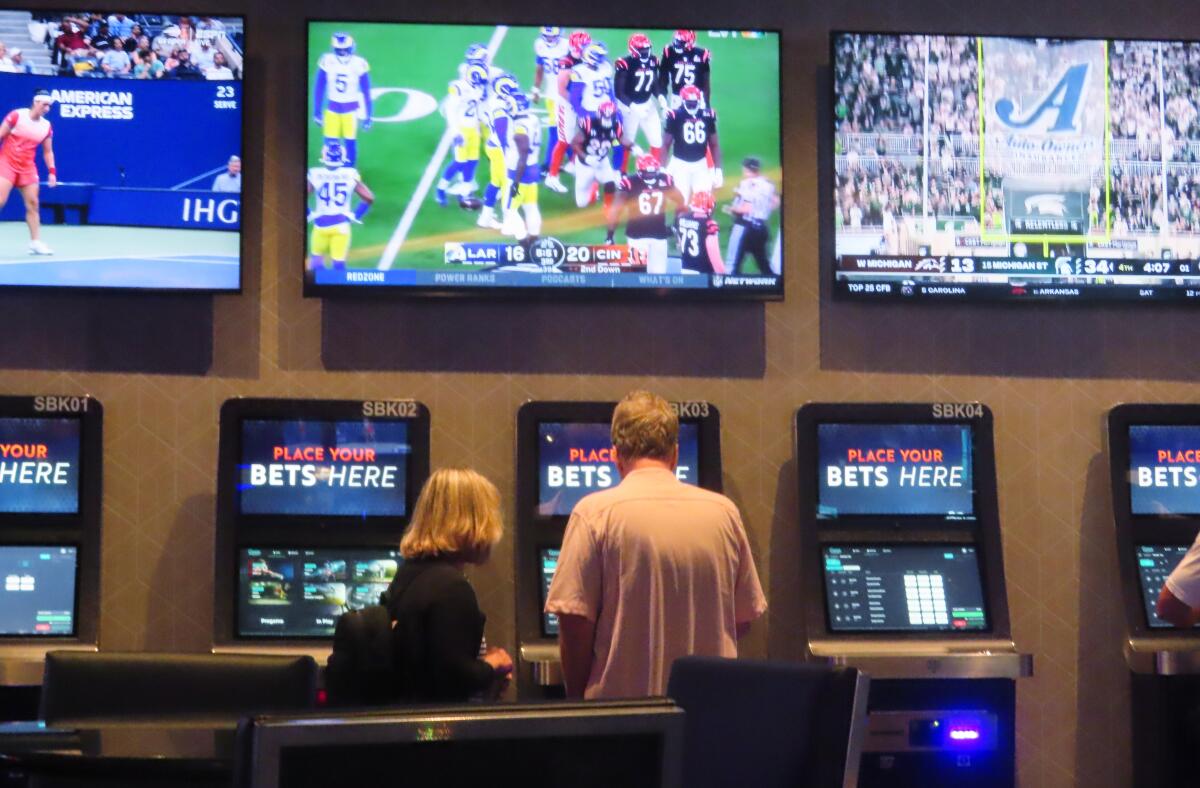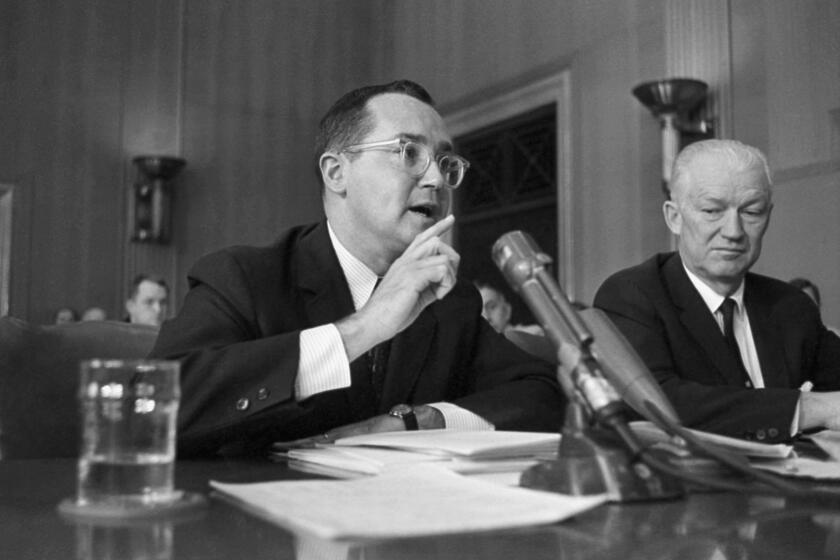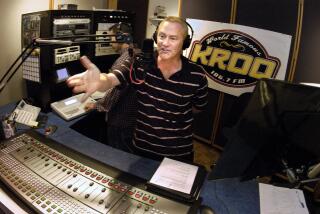Column: An abrupt format change at a beloved Bay Area station shows what’s wrong with the radio business

- Share via
Listeners of San Francisco’s KGO radio station woke up to a shock Monday.
The iconic AM station’s all-talk format was gone, supplanted by a sports gambling format and a branding change to “The Spread,” with the slogan, “The Bay’s Best Bet on Sports.”
Listeners had nowhere to go to express their dismay in public except the station’s Facebook page. “Corporate greed at its finest,” wrote one listener. “There is no sense of community anymore.”
KGO is a legacy radio station and it didn’t have to happen like this.
— Former KGO talk show host Pat Thurston
The station’s hosts, their voices suddenly cut off, fielded questions and comments from their audience members through private emails and tweets. “Just an avalanche of Facebook responses,” says Mark Thompson, who held forth on KGO weekdays from 10 a.m. to noon. “There’s rage, incredulity and this deep emotion associated with being disconnected from what was clearly a relationship that transcended information and news.”
Call it community. “People felt this immense connection,” Thompson told me. “‘You got me through COVID,’ is what I’ve heard more than anything. ‘You were my daily connection.’ It’s heartbreaking.” (Disclosure: I was a regular guest on Thompson’s show.)
Get the latest from Michael Hiltzik
Commentary on economics and more from a Pulitzer Prize winner.
You may occasionally receive promotional content from the Los Angeles Times.
The sudden, disorienting change at KGO may look superficially like a local Bay Area story, but it reflects two trends with national implications. For one thing, it echoes the evolution of the radio business from one reflecting local tastes and providing a communal source of information and news into a dispenser of homogenized, syndicated content.
That evolution began with the Telecommunications Act of 1996, which removed a cap of 20 AM and 20 FM stations that could be owned nationally by a single company and doubled to eight the number of stations a single owner could control in the largest metropolitan markets.
The law fostered a wave of mergers and acquisitions that produced immense national networks; Atlanta-based Cumulus Media, the owner of KGO and the nation’s second-largest network, owns 406 stations nationally, including six in the San Francisco market.
Cumulus didn’t respond to my requests for comment beyond referring me to a press release it issued Monday, stating that KGO would be managed jointly with the company’s other sports stations in the Bay Area, KNBR and KTCT.
The statement acknowledged KGO’s 80-year history at 810 on the AM dial but quoted the station’s general manager, Larry Blumhagen, as saying, “Times change, and we must change with them.”
Newton Minow looks back at the bombshell he fired at TV executives in 1961.
Many of these acquisitions were based on overly optimistic expectations of the profits to be made. That left the acquirers saddled with debt and therefore inclined to cut costs. Local staffs were cut to the bone, and syndicated content and infomercials began to fill the broadcast day.
Cumulus filed for bankruptcy protection in November 2017 and emerged in June 2018, having shed about $1 billion in debt in the process.
The largest radio network, IHeartMedia (formerly Clear Channel) filed for bankruptcy protection in March 2018 and completed its restructuring the following January, with its debt load cut by almost two-thirds.
Remote ownership of its radio stations hasn’t served the Bay Area well over time. For years, Walt Disney Co. was a big player in local media, thanks to its 1995 acquisition of Capital Cities/ABC. In addition to KGO, its properties included KSFO-AM, a talk radio station whose lineup of far-right hosts — among them Rush Limbaugh, Sean Hannity and Michael Savage — earned it the nickname “Sieg Heil on your dial.”
Under Cumulus, the lineup still includes Hannity, along with right-wingers Dan Bongino, Mark Levin and Ben Shapiro and a daily block of Fox News broadcasting.
The second trend is the expansion of sports gambling. As I reported earlier, sports gambling has metastasized coast to coast; 36 states and the District of Columbia have legalized it in one form or another since a 2018 Supreme Court decision that overturned a federal ban.
After shunning sports betting like poison, the pro sports leagues have gone all-in, quite likely because they see sports betting as a way to keep young men watching even out-of-market games on TV.
The latest incarnations of the sports betting craze are Propositions 26 and 27 on November’s California ballot, which would legalize sports betting in the state in slightly different ways.
Few corporations in the world strive to project as sunny a public image as Walt Disney Co.
Speculation among the KGO staff has been that the format change is a calculation by Cumulus — a gamble, as it were — that one of the measures will pass. If that’s so, it’s beginning to look like a bad bet, since both are polling very poorly and are expected to go down to defeat.
The format change isn’t the first misstep committed by KGO’s owners. The station was ranked No. 1 by Arbitron in the Bay Area from mid-1978 through 2008, a period in which it was known for hosts such as the perennially popular Ronn Owens and Len Tillem, a lawyer whose blunt-talking approach to legal affairs prefigured the popularity of television hosts such as Judith “Judge Judy” Sheindlin.
In 2007, Disney spun off its radio holdings to Las Vegas-based Citadel Broadcasting, which in turn was acquired by Cumulus in 2011. “We went from having a budget to having less of a budget to cost cutting,” recalls John Daly, a longtime producer at KGO.
“Cumulus was notoriously cheap,” says Pat Thurston, a KGO host whose program followed Thompson’s. Thurston and other staff members who participated in a Twitter group chat on Monday recalled their fruitless pleas for the company to invest in marketing and build up its advertising staff.
The schedule changed from local talk 24/7 to infomercials on weekends. Thurston was told by an executive that the parent considered infomercials a “cash cow”; the manager told her that there was even some consideration given to making KGO an all-infomercial, all-the-time station.
“We could make a lot of money doing infomercials,” he said, “and it would be the easiest way to do it.”
Soon after taking over, Cumulus decided to change KGO from all-talk to all-news, in a direct attack on the Bay Area’s existing all-news station, KCBS. Cumulus spent lavishly to build a newsroom, only to discover that “you couldn’t do news on the cheap,” in Daly’s words, and that KCBS was a powerhouse impervious to competition from a newcomer. Cumulus returned KGO to a talk format in 2016.
KCBS, which is owned by the Audacy radio conglomerate and is still all-news, is the No. 2-rated station in the market, according to Nielsen, behind only the public station KQED-FM. But KGO’s ratings were mired in the lower depths, ranked 20th overall in the market, though some hosts had higher ratings.
Politicians say they’re concerned about misinformation on Twitter and Facebook, but they’re blowing smoke.
The latest format change came as a shock to the station’s hosts, engineers and other workers. They were summoned to a staff meeting the morning of Oct. 5 and told only that “KGO as we know it will cease to exist,” Thurston recalls. They were told that KGO had lost $20 million since its acquisition by Cumulus and that the format would change, but not what the new format would be.
Thompson was instructed to go on the air as usual at 10 a.m. Thursday, but deliver the station’s ID at 10:15 a.m. and leave the booth. He pleaded with station managers for permission to acknowledge that the format was changing and bid his listeners farewell, but that was refused.
“I said, ‘Don’t you think we owe the audience an explanation of what’s happening? There are a lot of people who count on the station.’ They said, ‘Nope. This is the way we want to do it.’”
The airwaves were then taken over by a loop of money- and gambling-oriented music, including Pink Floyd’s “Money” and Lady Gaga’s “Poker Face” for three days, until the new format launched in the early morning hours Monday.
It’s proper to ask whether more sports and more gambling content is what the Bay Area is clamoring for, or whether Cumulus knows or even cares.
“We wanted to give people important breaking news, but with the wildfires up here we tried to help people find resources,” Thurston told me.
“People were calling in to us offering information for other people who were stranded,” she says. “During blackouts we were on the air, trying to help people find places to go to find gas and basic supplies. Nobody else had a call-in to allow listeners to participate, not just with their opinions but to provide newsworthy information, instantly, on the air. It really did feel like we were providing a community service.”
The future of KGO’s hosts is as uncertain as the destinations for their orphaned listeners. Thompson is launching a YouTube channel Wednesday and may explore other digital options such as podcasts, though those don’t lend themselves to interacting with listeners in real time, as radio does. Others will try to find homes on other stations.
KGO’s new listeners will be plied with syndicated sports programs, including such hosts as the notable blowhard Jim Rome — who already reached Bay Area listeners via KNBR — and eight hours of sports betting tips every weekday.
“It’s a damn, dirty shame,” Thurston says. “KGO is a legacy radio station, and it didn’t have to happen like this.”
More to Read
Get the latest from Michael Hiltzik
Commentary on economics and more from a Pulitzer Prize winner.
You may occasionally receive promotional content from the Los Angeles Times.













